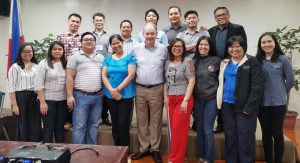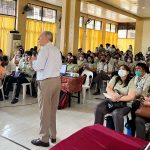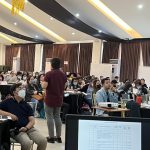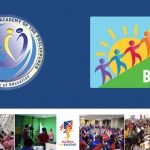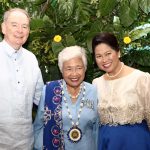NCR schools divisions trained on ‘higher-order’ pedagogy
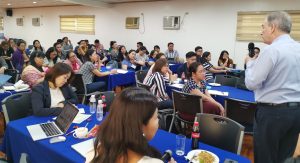
Dr. John Pegg, RCTQ Co-director and Director of RCTQ’s partner institution, the National Centre of Science, ICT, and Mathematics Education for Regional and Rural Australia (SiMERR), discusses the Structure of Observed Learning Outcomes (SOLO) Framework vis-a-vis the prevalent problems of comprehension and critical thinking among Filipino learners.
How could we address the problems of comprehension and critical thinking among our learners?
On November 18-19, RCTQ ran a two-day training-workshop on the Structure of Observed Learning Outcomes (SOLO) framework for all sixteen (16) schools divisions belonging to the DepEd National Capital Region (NCR) to help them in developing learning intervention materials that encourage high-order thinking for teachers and learners.
Organized by the DepEd NCR Human Resources Development Division (HRDD) and fully supported by NCR Regional Director Dr. Malcolm Garma, each schools division was represented by two representatives who were mostly subject area supervisors.
Dr. John Pegg, RCTQ Co-director and Director of RCTQ’s partner institution, the National Centre of Science, ICT, and Mathematics Education for Regional and Rural Australia (SiMERR), led the conduct of the two-day activity.
“We see this training as an opportunity to model DepEd NCR in the development of classroom interventions that are truly effective in improving the learning outcomes of our learners,” said Dr. Felix Trongco, chief of the DepEd NCR HRDD. “We then hope to see our gains replicated in other DepEd regions.”
The SOLO taxonomy, developed by Australian educational psychologist John B. Biggs, is a model that describes levels of increasing complexity in a learner’s understanding of subjects. It aids both trainers and learners in understanding the learning process.
The model consists of five levels in the order of understanding: 1) pre-structural, 2) uni-structural, 3) multi-structural, 4) relational, 5) extended abstract.
All sixteen (16) divisions were trained to develop questions and answers, depending on their subject areas, at the relational and extended abstract levels—also considered as higher-order thinking levels. Grouped according to their subject expertise, participants were asked to create a Work Application Plan where the steps in applying the learnings they acquired from the workshop were written.
Ms. Fatima Corina A. Robles, Teacher III from Bagumbayan Elementary School, Navotas, shared how the training gave her the opportunity to study and learn the SOLO framework alongside the National Educators Academy of the Philippines (NEAP) Transformation design.
“The training made us, teachers, reflect on our teaching-learning experiences. It allowed us to understand the framework comprehensively, and provided implications for our work as teachers in the classroom like asking appropriate questions to facilitate high-order functioning among our learners,” Ms Robles said.
RCTQ Director Dr. Gina Gonong discussed the NEAP Transformation project to help understand the context of the need to improve the quality of education through transformative teachers’ professional development.
The conduct of the workshop was ably supported by HRDD staff including Dr. Josefino Pogoy, Ms. Jennifer Vivas, and Mr. Christian Espanol.
https://www.rctq.ph/?p=857NewsNational Capital Region,NEAP Transformation,Structure of Observed Learning Outcomes



